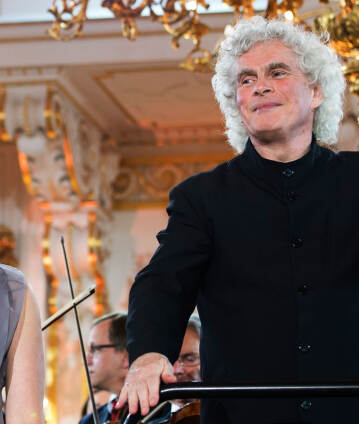Europakonzert from Prague with Sir Simon Rattle and Magdalena Kožená

On 1 May 2013, the Berliner Philharmoniker gave their annual Europakonzert in Prague for the third time. The venue on this occasion was the Czech capital’s famous medieval castle. Conducted by chief conductor Sir Simon Rattle, they performed Beethoven’s Pastoral Symphony, a work by Ralph Vaughan Williams, and Antonín Dvořák’s Biblical Songs with mezzo-soprano Magdalena Kožená in the castle’s sumptuous Spanish Hall.
After the Smetana Hall of the Prague Municipal House, an Art Nouveau building, in 1991 and the neoclassical Estates Theatre in 2006, the Berliner Philharmoniker gave a guest performance at Prague Castle. Some of the castle goes back as far as the Middle Ages, but all later periods have also left impressive architectural traces. On this occasion, the musicians had the opportunity to perform in the magnificent, white and gold “Spanish Hall”. The main symphonic contribution was Ludwig van Beethoven’s Pastoral Symphony, a work which increasingly took centre stage during Sir Simon Rattle’s tenure as chief conductor of the Philharmoniker. A first cycle of the complete symphonies was presented in 2008, and a second in 2015. Like all of the composer’s contributions to the genre, the Pastoral has an entirely independent character, and like all of his symphonies, it has had a significant influence on the course of music history. As the Beethoven symphony which refers most strongly to non-musical content, it also draws on Baroque descriptions of nature, foreshadowing programme music of the 19th and 20th centuries.
As usual, this European concert also paid musical tribute to the location itself. In this case, with Antonín Dvořák’s rarely performed Biblical Songs. The composer taught for many years at the conservatory in Prague and, together with his colleague Bedřich Smetana, played a significant role in providing the Czech national musical idiom with its international breakthrough. The soloist was mezzo-soprano Magdalena Kožená, also from the Czech Republic, who has performed a repertoire with the Berliner Philharmoniker ranging from the Bach Passions to Debussy’s Mélisande.
With Ralph Vaughan Williams’s Fantasia on a Theme by Thomas Tallis, the programme also included a work from the home of Kožená’s husband, Sir Simon. The composition, unusually scored for a string orchestra divided into three parts, is based on a musical theme from the Renaissance. All in all, the 2013 European Concert provided the audience in the hall – as well as the many viewers of the live broadcast all over the world – with a programme with rich geographical and music-historical cross-references in an impressive ambience.
© 2013 EuroArts Music International
Categories
Artists
Our recommendations
- Simon Rattle conducts the 2016 Europakonzert in Røros
- Europakonzert 2008 from Moscow with Simon Rattle and Vadim Repin
- Europakonzert from Athens with Simon Rattle and Daniel Barenboim
- 2005 Europakonzert from Budapest with Simon Rattle and Leonidas Kavakos
- Simon Rattle conducts the 2015 Europakonzert in Athens
- Europakonzert 2011 from Madrid with Simon Rattle and Cañizares